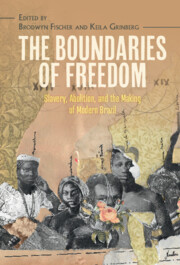Book contents
- The Boundaries of Freedom
- Afro-Latin America
- The Boundaries of Freedom
- Copyright page
- Contents
- Figures
- Tables
- Acknowledgments
- Introduction Slavery and Freedom in Nineteenth-Century Brazil
- Part I Law, Precarity, and Affective Economies during Brazil’s Slave Empire
- 1 The Crime of Illegal Enslavement and the Precariousness of Freedom in Nineteenth-Century Brazil
- 2 “Hellish Nurseries”
- 3 Agrarian Empires, Plantation Communities, and Slave Families in a Nineteenth-Century Brazilian Coffee Zone
- 4 Motherhood Silenced
- 5 The Abolition of Slavery and International Relations on the Southern Border of the Brazilian Empire, 1840–1865
- Part II Bounded Emancipations
- Part III Racial Silence and Black Intellectual Subjectivities
- Part IV Afterlives of Slavery, Afterwards of Abolition
- Bibliography
- Index
2 - “Hellish Nurseries”
Slave Smuggling, Child Trafficking, and Local Complicity in Nineteenth-Century Pernambuco
from Part I - Law, Precarity, and Affective Economies during Brazil’s Slave Empire
Published online by Cambridge University Press: 10 March 2022
- The Boundaries of Freedom
- Afro-Latin America
- The Boundaries of Freedom
- Copyright page
- Contents
- Figures
- Tables
- Acknowledgments
- Introduction Slavery and Freedom in Nineteenth-Century Brazil
- Part I Law, Precarity, and Affective Economies during Brazil’s Slave Empire
- 1 The Crime of Illegal Enslavement and the Precariousness of Freedom in Nineteenth-Century Brazil
- 2 “Hellish Nurseries”
- 3 Agrarian Empires, Plantation Communities, and Slave Families in a Nineteenth-Century Brazilian Coffee Zone
- 4 Motherhood Silenced
- 5 The Abolition of Slavery and International Relations on the Southern Border of the Brazilian Empire, 1840–1865
- Part II Bounded Emancipations
- Part III Racial Silence and Black Intellectual Subjectivities
- Part IV Afterlives of Slavery, Afterwards of Abolition
- Bibliography
- Index
Summary
This chapter discusses how slave traffickers adapted to the new circumstances created by Brazil’s 1831 ban on the transatlantic slave trade. While the ban by no means prevented further slave trafficking, it did force significant changes. In Pernambuco, the fourth most important destination for enslaved Africans in the Americas, traders could still reap abundant profits if they were willing to use small ships, pack them with the compact bodies of children and adolescents, and forge active partnerships with the complicit plantation owners who controlled the coast, roads, and towns surrounding Brazil’s natural harbors. In encouraging these new and brutal economic logics, the 1831 ban deeply impacted both the social demographics of Pernambucan slavery and the political and economic networks that structured the province.
Keywords
- Type
- Chapter
- Information
- The Boundaries of FreedomSlavery, Abolition, and the Making of Modern Brazil, pp. 57 - 82Publisher: Cambridge University PressPrint publication year: 2022



